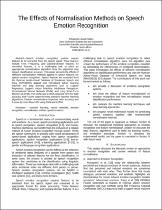JavaScript is disabled for your browser. Some features of this site may not work without it.
- ResearchSpace
- →
- Research Publications/Outputs
- →
- Conference Publications
- →
- View Item
| dc.contributor.author |
Sefara, Tshephisho J

|
|
| dc.date.accessioned | 2020-03-17T13:08:55Z | |
| dc.date.available | 2020-03-17T13:08:55Z | |
| dc.date.issued | 2019-11 | |
| dc.identifier.citation | Sefara, T.J. 2019. The effects of normalisation methods on speech emotion recognition. In: IEEE International Multidisciplinary Information Technology and Engineering Conference (IMITEC) 2019, Vanderbijlpark, South Africa, 21-22 November 2019 | en_US |
| dc.identifier.isbn | 978-1-7281-0040-1 | |
| dc.identifier.isbn | 978-1-7281-0041-8 | |
| dc.identifier.uri | https://ieeexplore.ieee.org/document/9015895 | |
| dc.identifier.uri | DOI: 10.1109/IMITEC45504.2019.9015895 | |
| dc.identifier.uri | http://hdl.handle.net/10204/11330 | |
| dc.description | Presented at: IEEE International Multidisciplinary Information Technology and Engineering Conference (IMITEC) 2019, Vanderbijlpark, South Africa, 21-22 November 2019. This is the accepted version of the published item. | en_US |
| dc.description.abstract | Speech emotion recognition systems require features to be extracted from the speech signal. These features include Time, Frequency, and Cepstral-domain features. To normalise features, it is a challenging task to select an appropriate normalisation algorithm since the algorithm may impact classification accuracy. This paper presents the effects of different normalisation methods applied to speech features for speech emotion recognition. Speech features are extracted from the Ryerson Audio-Visual Database of Emotional Speech and Song (RAVDESS) dataset and normalised before training machine and deep learning algorithms such as Logistic Regression, Support Vector Machine, Multilayer Perceptron, Convolutional Neural Network (CNN), and Long Short-Term Memory (LSTM). The CNNs and LSTMs obtained 72% for both accuracy and F1score outperforming standard machine learning algorithms. Feature normalisation improved both accuracy and F1score by more than 14% using CNN and LSTM. | en_US |
| dc.language.iso | en | en_US |
| dc.relation.ispartofseries | Workflow;23287 | |
| dc.subject | Machine learning | en_US |
| dc.subject | Neural networks | en_US |
| dc.subject | Emotion recognition | en_US |
| dc.subject | Normalisation method | en_US |
| dc.subject | Speech emotions | en_US |
| dc.title | The effects of normalisation methods on speech emotion recognition | en_US |
| dc.type | Conference Presentation | en_US |
| dc.identifier.apacitation | Sefara, T. J. (2019). The effects of normalisation methods on speech emotion recognition. http://hdl.handle.net/10204/11330 | en_ZA |
| dc.identifier.chicagocitation | Sefara, Tshephisho J. "The effects of normalisation methods on speech emotion recognition." (2019): http://hdl.handle.net/10204/11330 | en_ZA |
| dc.identifier.vancouvercitation | Sefara TJ, The effects of normalisation methods on speech emotion recognition; 2019. http://hdl.handle.net/10204/11330 . | en_ZA |
| dc.identifier.ris | TY - Conference Presentation AU - Sefara, Tshephisho J AB - Speech emotion recognition systems require features to be extracted from the speech signal. These features include Time, Frequency, and Cepstral-domain features. To normalise features, it is a challenging task to select an appropriate normalisation algorithm since the algorithm may impact classification accuracy. This paper presents the effects of different normalisation methods applied to speech features for speech emotion recognition. Speech features are extracted from the Ryerson Audio-Visual Database of Emotional Speech and Song (RAVDESS) dataset and normalised before training machine and deep learning algorithms such as Logistic Regression, Support Vector Machine, Multilayer Perceptron, Convolutional Neural Network (CNN), and Long Short-Term Memory (LSTM). The CNNs and LSTMs obtained 72% for both accuracy and F1score outperforming standard machine learning algorithms. Feature normalisation improved both accuracy and F1score by more than 14% using CNN and LSTM. DA - 2019-11 DB - ResearchSpace DP - CSIR KW - Machine learning KW - Neural networks KW - Emotion recognition KW - Normalisation method KW - Speech emotions LK - https://researchspace.csir.co.za PY - 2019 SM - 978-1-7281-0040-1 SM - 978-1-7281-0041-8 T1 - The effects of normalisation methods on speech emotion recognition TI - The effects of normalisation methods on speech emotion recognition UR - http://hdl.handle.net/10204/11330 ER - | en_ZA |






